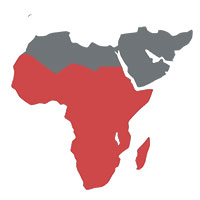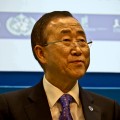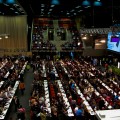“We Have Not Come Here To Negotiate Ourselves Out Of Existence”
Karuna Rana | December 11, 2011.
![]() The Joint High-Level Segment meeting of the 17th Conference of the Parties (COP 17) on Tuesday ended with a candid statement delivered by Grenada on behalf of the Alliance of Small Island States (AOSIS). “We believe that this multi-lateral rules system is critical to the survival of our countries”, said Karl Hood, Minister of Foreign Affairs, Grenada, for AOSIS.
The Joint High-Level Segment meeting of the 17th Conference of the Parties (COP 17) on Tuesday ended with a candid statement delivered by Grenada on behalf of the Alliance of Small Island States (AOSIS). “We believe that this multi-lateral rules system is critical to the survival of our countries”, said Karl Hood, Minister of Foreign Affairs, Grenada, for AOSIS.
The AOSIS represent a group of 44 islands most vulnerable to the effects of climate change. Over the past few years, they have repeatedly voiced out concern over the delay for countries in committing to an international legally-binding treaty that will ensure global warming remains below 1.5 oC. Their survival remains at stake.
“We have not come here to negotiate ourselves out of existence but this is what will happen if we give in to some of the proposals put forward in the last couple of days”, said Hood, referring to proposals made to leave Durban without a final resolution on the second commitment period under the Kyoto Protocol. He demanded for the mandate of this protocol to be a priority and also demanded for a complementary protocol that will cover countries which are not parties to the Kyoto Protocol.
“This process can deliver the outcomes that will guarantee the survival of vulnerable countries as long as we can find the political will to do so”, he said, in the presence of South African President Jacob Zuma, UN Secretary-General Ban Ki-Moon, Executive Secretary to the UNFCCC Christiana Figueres and Heads of States and Governments. The challenge for all negotiators to demonstrate a political will was the key message of AOSIS’s official position, stated not once but twice.
He also called upon the COP Presidency to agree on the implementation of the Cancun Agreement and to resolve outstanding issues on the Green Climate Fund, Adaptation Committee, the technology related institutions, also including processes to assist the Least Developed Countries and Africa.
He added that a robust process for the 2015 review has to be ensured. “The 2015 review was part of the delicate political balance that we struck in Copenhagen and Cancun. If this balance is not respected, then other elements of that political balance could suffer the same fate”, he stated.
Hood boldly pointed out the lack of transparency of this process. “Let us not speak one thing outside of the negotiating room and another inside the room”, he said, adding that national interests should not overtake global interests.
“We must save tomorrow, today.” With COP 17 coming to an end tomorrow, these ending words of the AOSIS statement made a strong point on the urgency of the climate change negotiations.
By Karuna Rana, photos by Julian Koschorke.













comment